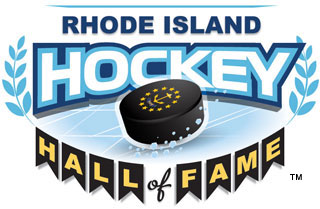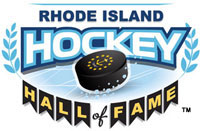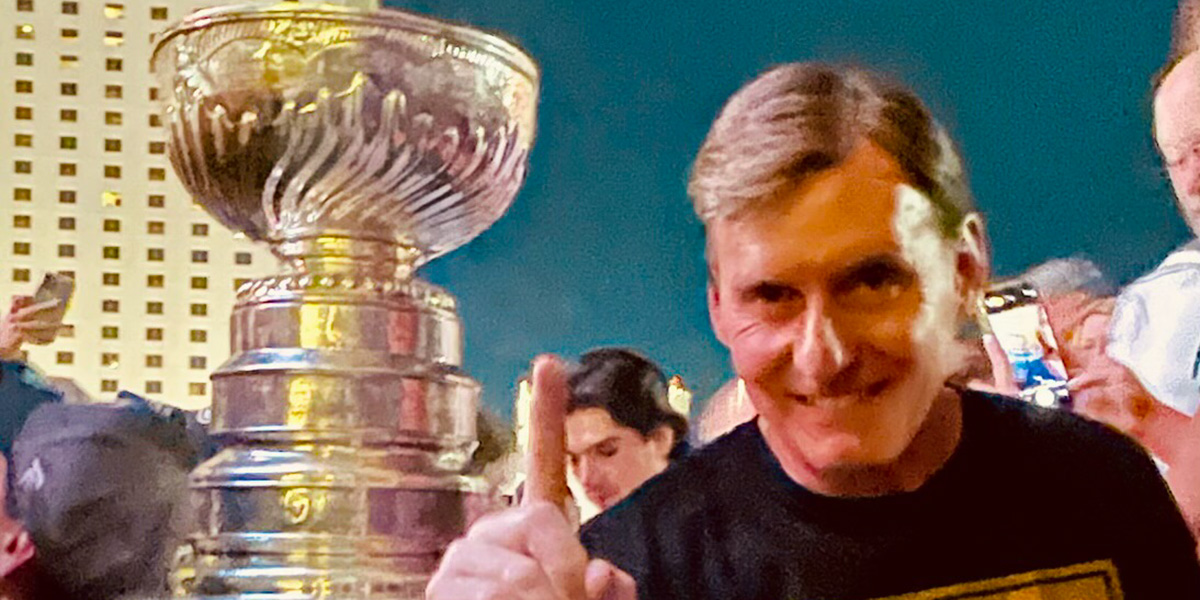When the Vegas Golden Knights open defense of their Stanley Cup championship on October 10, the team will have for its seventh season a TV-radio broadcaster from Pawtucket who himself has achieved quite the record of success.
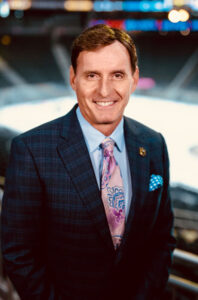 Dave Goucher joined the NHL team six seasons ago, bringing with him his iconic “Get the duck boats ready!” radio call of the Boston Bruins’ Stanley Cup win in 2011 and was at the mic for the Providence Bruins’ Calder Cup title in 1999. With the Golden Knights’ stellar playoff performance this past season, Dave achieved a rather unique hat trick with a third championship ring. Coincidence? Perhaps not.
Dave Goucher joined the NHL team six seasons ago, bringing with him his iconic “Get the duck boats ready!” radio call of the Boston Bruins’ Stanley Cup win in 2011 and was at the mic for the Providence Bruins’ Calder Cup title in 1999. With the Golden Knights’ stellar playoff performance this past season, Dave achieved a rather unique hat trick with a third championship ring. Coincidence? Perhaps not.
“I didn’t realize until recently the 12-year symmetry of those three championships,” Dave said. “I have been very fortunate to broadcast games for a total of 30 years and 23 years in the NHL. There are guys who do this job and have never been around a championship team. Let’s hope I am still around 12 more years from now.”
Dave’s storied travels began rather serendipitously at age five when a neighbor, who was coaching a squirt team in Pawtucket, asked his parents if their son ever thought of playing hockey. “The answer was ‘No,’” Dave recalled, “but we were big Boston Bruins fans. I’m glad he walked across the street and asked, because I don’t know where I would be if I did not get into hockey when I was a young kid.”
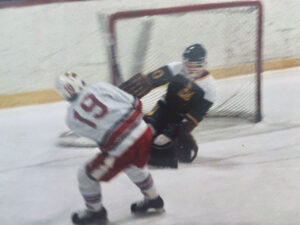 His fledgling ice time eventually led him to skate for William E. Tolman Senior High School’s varsity team, which came oh so close, but lost in the state semifinals three years in a row. After graduating in 1987, Dave set his sights on Boston University. “My original plan was to play hockey in college, but the Terriers didn’t need me at all,” he joked. “Pursuing a career in broadcasting was in the back of my mind. It looked like a cool job; you get to go to games for free, travel, and they gave you money to do it. That was about as deep as my thinking went at the time.”
His fledgling ice time eventually led him to skate for William E. Tolman Senior High School’s varsity team, which came oh so close, but lost in the state semifinals three years in a row. After graduating in 1987, Dave set his sights on Boston University. “My original plan was to play hockey in college, but the Terriers didn’t need me at all,” he joked. “Pursuing a career in broadcasting was in the back of my mind. It looked like a cool job; you get to go to games for free, travel, and they gave you money to do it. That was about as deep as my thinking went at the time.”
Honing his craft
Dave did delve deeper and called about 45 home and away games for B.U.’s student radio station, WTBU, during his junior and senior years, as well as the Beanpot Tournament and Hockey East playoffs in 1992 and 1993 with his roommate Rich Keshian. That time at the mic afforded him an invaluable opportunity to hone his craft, aided by his own experience having played the game.
“My time at B.U. gave me an opportunity to work on those skills on a very small stage,” Dave added. “Hockey is the fastest game there is, but you cannot broadcast it like it is a horse race. It is more a case of using words properly, being able to paint a mental picture for the listeners, and doing it at a pace that people can understand.”
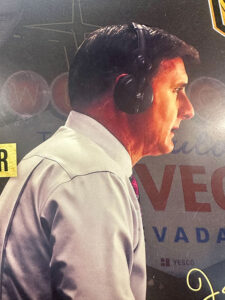 After graduation in 1993, it was time to pursue broadcasting full-time. After a dozen or so resumé tapes were mailed, a conversation with his friend Bernie Corbett, decades-long radio broadcaster of B.U. hockey and Harvard University football, turned fortuitous. Corbitt heard through the hockey grapevine that an East Coast Hockey League team in Wheeling, West Virginia, was looking for a radio play-by-play guy. “My response was ‘Bernie, where the hell is Wheeling, West Virginia?’” Dave said. “I wouldn’t even know where to look for it on a map.”
After graduation in 1993, it was time to pursue broadcasting full-time. After a dozen or so resumé tapes were mailed, a conversation with his friend Bernie Corbett, decades-long radio broadcaster of B.U. hockey and Harvard University football, turned fortuitous. Corbitt heard through the hockey grapevine that an East Coast Hockey League team in Wheeling, West Virginia, was looking for a radio play-by-play guy. “My response was ‘Bernie, where the hell is Wheeling, West Virginia?’” Dave said. “I wouldn’t even know where to look for it on a map.”
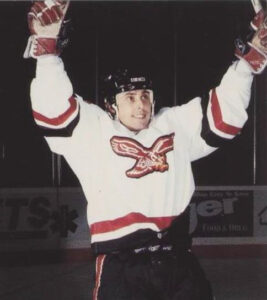 Proving that hockey is a very close-knit community, Bernie snagged this tip from former B.U defenseman Tom Dion, who was playing for the Wheeling Thunderbirds. It also just so happened the team’s general manager was former Providence College All-American defenseman Larry Kish. He listened to Dave’s tape and invited him down for an interview. Two weeks after that 12-hour drive to meet Kish at the only local sports bar in Wheeling, Dave had his first professional radio job. As the proverbial big fish in the small pond, he called all 68 Wheeling Thunderbirds’ games on a 50,000-watt FM radio station and simulcast about a dozen games on a local TV station.
Proving that hockey is a very close-knit community, Bernie snagged this tip from former B.U defenseman Tom Dion, who was playing for the Wheeling Thunderbirds. It also just so happened the team’s general manager was former Providence College All-American defenseman Larry Kish. He listened to Dave’s tape and invited him down for an interview. Two weeks after that 12-hour drive to meet Kish at the only local sports bar in Wheeling, Dave had his first professional radio job. As the proverbial big fish in the small pond, he called all 68 Wheeling Thunderbirds’ games on a 50,000-watt FM radio station and simulcast about a dozen games on a local TV station.
Coming home
After two seasons in Wheeling, Dave’s next break came fortuitously while on vacation back home in Rhode Island, meeting with an old college friend. “About 15 minutes into dinner, she said ‘By the way, the Providence Bruins are looking for a radio announcer.’ I thought ‘That is burying the lead. What took you so long to tell me?’” Dave chuckled. She turned Dave onto Randy Scott, the team’s vice president of marketing and communications.
“To be honest, at first he did not seem very impressed with me,” Dave remembered. “My call to him was out of the blue, so I guess I can’t blame him. We met when I was back in town, and, fortunately two weeks later, I got the job. To tell you the truth, I was not making enough money at the time to get my own place, so I moved back into my old bedroom in Pawtucket.”
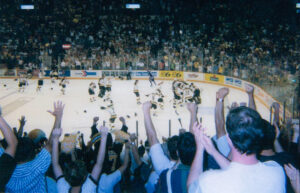 The P-Bruins were a five-year roller coaster ride, from the depths of last place in 1998 to the Calder Cup championship in 1999 under head coach and former P-Bruins defenseman Peter Laviolette, who coincidentally coached that same Wheeling team the year before returning to Providence.
The P-Bruins were a five-year roller coaster ride, from the depths of last place in 1998 to the Calder Cup championship in 1999 under head coach and former P-Bruins defenseman Peter Laviolette, who coincidentally coached that same Wheeling team the year before returning to Providence.
In April 2000, the Boston Bruins’ radio play-by-play position opened when the late Bob Neumeier announced plans to leave. Dave had been in the Bruins’ organization for five years now, but, despite his contacts, it wasn’t automatic. The team and its flagship radio station WBZ could simply dip into the minors to fill the vacancy. That became abundantly clear when Dave grabbed the Boston Herald just before departing with the P-Bruins for an eight-hour bus ride to Québec City for two playoff games against the Citadels. The newspaper touted an early frontrunner for the post.
Before the bus headed out, Dave called WBZ general manager Ted Jordan. Much to Dave’s surprise, Jordan took the call and, after a quick pitch, Dave had an interview for the coming Friday afternoon. Well, of course, the Thursday night game went late into double overtime and the team didn’t arrive home until 8 a.m. Friday morning. Dave had just enough time to nap, shower, and drive to Boston in time for his meeting.
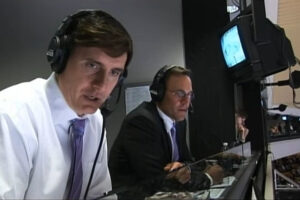 He was among five finalists whose test was to sit in an empty conference room at WBZ and call a hockey game off TV monitors. “Fortunately, when the music stopped, I still had a chair and the job,” Dave said. “It’s funny the things you remember all these years later. If you told me when I was eight, 12, 18, or even 28 years old that I would be the Bruins radio announcer someday, I would say ‘That’s the only job I’ll ever want.’”
He was among five finalists whose test was to sit in an empty conference room at WBZ and call a hockey game off TV monitors. “Fortunately, when the music stopped, I still had a chair and the job,” Dave said. “It’s funny the things you remember all these years later. If you told me when I was eight, 12, 18, or even 28 years old that I would be the Bruins radio announcer someday, I would say ‘That’s the only job I’ll ever want.’”
He also got to meet two of his broadcasting idols – Bruins’ TV icon Fred Cusick and radio maven Bob Wilson. “To be able to meet them and get to know them was incredible for me as a kid from Pawtucket who used to listen to them my whole life,” he added.
The Best in Boston
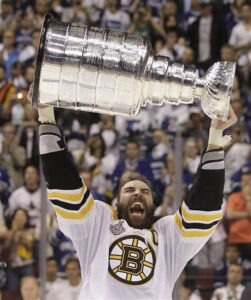 For the next 17 years, Dave had a tremendous run of success. The Associated Press (AP) named him New England’s top radio play-by-play announcer in 2003, 2006, 2007, and 2010, and presented him with AP’s Best Sportscast award in 2007. He also called a package of college hockey games on TV for NBCSN over two seasons starting in 2013. When the NHL in 2016 awarded Las Vegas its next expansion franchise, the chance to transition to a different medium was not a quantum leap.
For the next 17 years, Dave had a tremendous run of success. The Associated Press (AP) named him New England’s top radio play-by-play announcer in 2003, 2006, 2007, and 2010, and presented him with AP’s Best Sportscast award in 2007. He also called a package of college hockey games on TV for NBCSN over two seasons starting in 2013. When the NHL in 2016 awarded Las Vegas its next expansion franchise, the chance to transition to a different medium was not a quantum leap.
“I had to weigh doing radio in Boston against doing TV in another city,” Dave reflected, “but when you are talking Las Vegas – one of the most unique places on the planet – the city’s first-ever major league team, and it is television, that’s a whole different deal.”
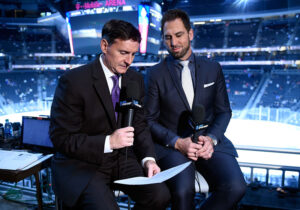 Dave’s diverse talent helped him beat the odds and outperform some 200 people who reportedly applied for the Golden Knights’ TV and radio jobs. Now he is partnered with former NHL defenseman Shane Hnidy. Much of their chemistry is from Dave having called Shane’s games when both men were with the Bruins in Boston. He also has taken to Las Vegas and the Golden Knights with the same fervor as the rest of the community. “You can’t go five minutes without seeing a Golden Knights license plate, hat, or tee shirt, and their popularity is now at an all-time high since winning the Stanley Cup,” he added.
Dave’s diverse talent helped him beat the odds and outperform some 200 people who reportedly applied for the Golden Knights’ TV and radio jobs. Now he is partnered with former NHL defenseman Shane Hnidy. Much of their chemistry is from Dave having called Shane’s games when both men were with the Bruins in Boston. He also has taken to Las Vegas and the Golden Knights with the same fervor as the rest of the community. “You can’t go five minutes without seeing a Golden Knights license plate, hat, or tee shirt, and their popularity is now at an all-time high since winning the Stanley Cup,” he added.
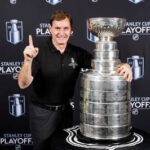 So, is Las Vegas the last stop for Pawtucket’s native son? “I think so,” Dave confirmed. “I will always appreciate my time with the Bruins organization, as it helped me land in a great spot. The quality of life is so great here and I have one of the best jobs in the business.”
So, is Las Vegas the last stop for Pawtucket’s native son? “I think so,” Dave confirmed. “I will always appreciate my time with the Bruins organization, as it helped me land in a great spot. The quality of life is so great here and I have one of the best jobs in the business.”
By Wayne Forrest
